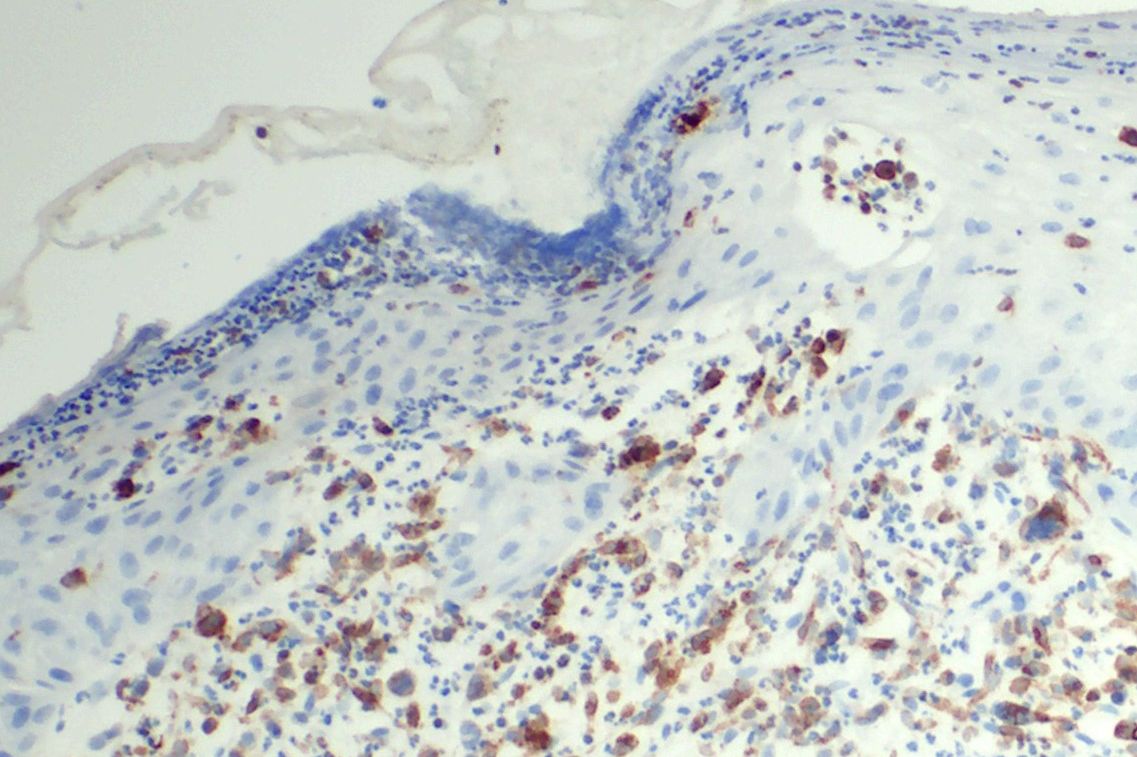
(Vienna/Berlin, 05 March 2025) - Cutaneous T-cell lymphoma is a rare form of blood cancer, the advanced stages of which are associated with a poor prognosis. A new study by MedUni Vienna, Charité – Universitätsmedizin Berlin and the Max Delbrück Center has identified the protein CD74 as a promising target for innovative treatments. The research group was able to show that antibody-drug conjugates (ADCs) that specifically bind to CD74 can effectively kill cancer cells.
Cutaneous T-cell lymphoma (CTCL) is a rare form of blood cancer that primarily affects the skin. In Europe, the disease occurs with a frequency of around 0.5 cases per 100,000 inhabitants per year. With the treatment options available to date, advanced stages in particular are associated with a poor prognosis and quality of life.
A team of researchers from MedUni Vienna led by Olaf Merkel and the Experimental and Clinical Research Center (ECRC), a joint institution of Charité and the Max Delbrück Center, led by Stephan Mathas has shown in a new study that the CD74 protein expressed on CTCL cells is a promising target for innovative therapies. The study showed that so-called antibody-drug conjugates (ADCs), which specifically bind to CD74, can effectively kill CTCL cells.
New therapeutic approach for a difficult-to-treat disease
Curative treatment options for cutaneous T-cell lymphomas are still lacking. Although monoclonal antibodies and ADCs are already being used, the spectrum of targetable cell surface structures is limited. The new study shows that CD74 is strongly and consistently expressed in various CTCL subtypes, including particularly difficult-to-treat forms such as Sézary syndrome and advanced stages of mycosis fungoides.
"Our results show that CD74 is not only an attractive target molecule for antibody therapy, but that its blockade can lead to complete tumour eradication in preclinical models," explains Olaf Merkel. It is particularly noteworthy that the treatment was highly effective even in TP53-defective CTCL cells - an aspect of great clinical relevance.
Basis for future clinical trials
The findings of this study provide a solid basis for further developing CD74 as a new target for CTCL and paving the way for clinical trials. "Our results open up new perspectives for the treatment of CTCL patients who currently have inadequate treatment options," emphasise the study authors.
The researchers see CD74-targeted therapy as a promising approach to sustainably improve treatment options for patients with advanced CTCL.
Publication: British Journal of Dermatology
Preclinical in vitro and in vivo evidence for targeting CD74 as an effective treatment strategy for cutaneous T-cell lymphomas
Mariantonia Costanza, Catello Giordano, Ann-Christin von Brünneck, Jing Zhao, Ahmad Makky, Katharina Vinh, Ivonne Aidee Montes-Mojarro, Florian Reisinger, Stephan Forchhammer, Agnieszka Witalisz-Siepracka, Sophie Edtmayer, Dagmar Stoiber, Gang Yin, David Horst, Anja Fischer, Reiner Siebert, Jan P Nicolay, Menghong Yin, Martin Janz, Falko Fend, Jürgen C Becker, Christian M Schürch, Lukas Kenner, Chalid Assaf, Olaf Merkel and Stephan Mathas
Br J Dermatol 2025; 00:1-13
https://doi.org/10.1093/bjd/ljaf001